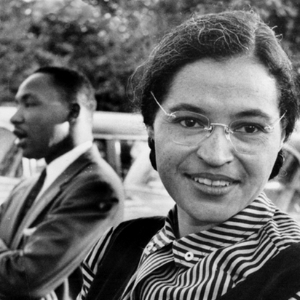by Maria Jirau-Torres, MA, Language Access Coordinator for the National Sexual Violence Resource Center
 Rosa Parks wouldn’t give up her seat on the bus to a white man. She worked all day too and was tired. But the truth is actually a tad different than the popular story about Ms. Rosa Parks and equally impressive and inspiring. I address her as Ms. Parks because I would get quite a look from my elders in my culture by addressing my elder by their first name. I’m NOT going there; Respect. Ms. Rosa refused to give her seat on that bus not because she was physically tired as most think. She was a different kind of tired. Many were. She was tired of being oppressed. Tired of being treated as “less than” on that day, on that bus, in that town, in America.You go Ms. Rosa! How courageous.
Rosa Parks wouldn’t give up her seat on the bus to a white man. She worked all day too and was tired. But the truth is actually a tad different than the popular story about Ms. Rosa Parks and equally impressive and inspiring. I address her as Ms. Parks because I would get quite a look from my elders in my culture by addressing my elder by their first name. I’m NOT going there; Respect. Ms. Rosa refused to give her seat on that bus not because she was physically tired as most think. She was a different kind of tired. Many were. She was tired of being oppressed. Tired of being treated as “less than” on that day, on that bus, in that town, in America.You go Ms. Rosa! How courageous.
But did you know that Ms. Rosa was not the first person to refuse to give up their seat on the bus to a white person? Yes folks! There were others that said enough is enough, such as 15 year-old Claudette Colvin. On March 2, 1955, Ms. Claudette was heading home from high school with a couple of friends. In my mind, it went something like this:
Bus Driver: “Give up your seat for this woman.
Claudette: “No! Why should I!”
Bus Driver: “What did you say? That’s it. Officer, this person is breaking the law. Arrest her!”
Claudette, 15 years old, probably terrified: ‘No. You can’t make me! I hate you’
This dramatic re-enactment is brought to you with a hint of my own personality and a heap of my experience as a mother of 5 teens.
 Police were called and Ms. Claudette was said to have been removed forcibly in handcuffs while Ms. Rosa gave an account of being treated respectfully by the police. Their cases became a part of a Supreme Court hearing known as Browder vs. Gayle that led the way for the Montgomery Bus Boycott.
Police were called and Ms. Claudette was said to have been removed forcibly in handcuffs while Ms. Rosa gave an account of being treated respectfully by the police. Their cases became a part of a Supreme Court hearing known as Browder vs. Gayle that led the way for the Montgomery Bus Boycott.
Ms. Rosa and Ms. Claudette were both active members of the NAACP who were hip to resistance and social change. Each of their decisions to resist was the culmination of years of suffering and was the tipping point that allowed the whole community to mobilize to boycott the bus system. Ms. Rosa was equally fierce advocating against rape and that was no small feat in those times. You can believe that even the smallest, spontaneous action can provoke and move a system to change.
Black history is American history and should not be relegated to 28 days in a year. Let’s turn the pages of history books and see the faces of these fierce and mighty advocates that changed the direction of our country. We have a very long way to go but we know how to represent and advocate because of these pioneers.
